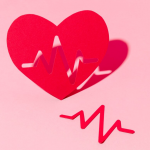Stress is a normal part of being human. We all feel it at some point, and in fact, our bodies are fine tuned by evolution to deal with it in acute (short) doses. We pump out adrenaline and cortisol during a time of acute stress (physical or psychological), to provide oxygen and fuel to our heart, brain, muscles, and other body tissues. This hormonal response is important – picture yourself running away from a wild animal and you get the picture.
During an acute stress, appetite is actually suppressed, as there are more pressing things going on (the stressor itself) than finding, eating, and digesting food. This is because levels of glucose, insulin, and a pituitary hormone called corticotropin releasing hormone (CRH) are higher, which inhibit appetite.
Soon after an acute stress, glucose, insulin and CRH settle down, but cortisol is still active, which directly stimulates appetite in our brains. Cortisol also increases the production of the hunger hormone ghrelin. From an evolutionary perspective, the hunger after an acute stress is designed to fuel us back up after spending energy facing the stressor. High fat or high sugar foods also stimulate dopamine and opioid pathways in our brains – the ‘feel-good’ reward circuitry that comforts us after that stressful event.
The problem arises with chronic stress. We are not designed to handle chronic ongoing stress. As described in this excellent review, with chronic stress, cortisol is chronically elevated, which causes many maladaptive changes to our bodies, including:
- Stimulation of appetite directly in the homeostatic centre of the brain (arcuate nucleus)
- increases ghrelin (the hunger hormone)
- promoting reward-driven (hedonic) overeating (stimulates dopaminergic circuitry)
- promoting visceral fat accumulation (the metabolically dangerous fat around our organs/belly)
- Increased inflammation
- Altering gut bacteria in favor of those promoting obesity
- slowing of energy expenditure (downregulates thyroid hormone and UCP-1 expression in brown adipose tissue)
There is also a vicious cycle happening on at least two fronts:
- inflammation stimulates a further stress response and possibly cortisol resistance
- weight bias and stigma further increases stress
Chronic stress also promotes a general shift from eating in response to hunger (homeostatic eating), to eating for the reward and emotional gratification (hedonic eating). High fat diets can increase sensitization of these reward pathways in our brains, increasing cravings for high calorie foods.
Interestingly, not everyone eats more in response to stress. Studies suggest that some people actually decrease their calorie intake when stressed, and some do not have a change in how much they eat. These differences may relate to the type of stress (physical vs emotional vs social, etc), the duration of stress, personality traits, the background presence or absence of an emotional relationship with food, genetic background, or even epigenetic (new to your genetic makeup) changes from stressful periods before or around the time we were born (eg malnutrition, separation from parents, abuse, etc).
Now, I am not suggesting that everyone with stress who is struggling with weight should get their cortisol checked – it will very likely still fall within the normal range, but may be higher than what your normal would be if you were not stressed. The cortisol testing that is done by doctors is designed to detect nodules or tumors that may be causing an increase in cortisol production, which are rare. These tests are not designed to figure out if your body is making more cortisol because of stress.
So what can we do about this?? Well, clearly, stress reduction is paramount. And as we all know, this is often much easier said than done! Here are some suggestions from Health Canada on coping with stress, stress prevention, and a list of great resources.
The Three Pillars Of Weight Management are important treatment options for people who struggle with elevated weight (stress management is listed under the first Pillar).
Share this blog post using your favorite social media link below!
Follow me on twitter! @drsuepedersen
www.drsue.ca © 2021












